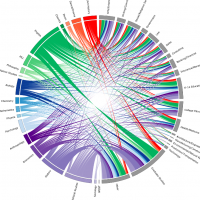
How will the era of big data affect the world of the residential liberal arts college? Kenyon is as a complex network of knowledge resources, expertise, and opportunities. Technology may open the door to tools capable of visualizing the Kenyon knowledge network in order to deepen the learning and intellectual experience of our whole community.

Mr. López has reminded us of the importance of taking a firm stand on one’s principles, even in the face of severe consequences.We often neglect the value of dissent on our campus – the importance of cultivating an atmosphere in which difficult topics are rigorously engaged, where opinions (including those held by people in positions of power) are openly challenged, and where members of the community feel empowered to take strong stands in a press for change. A place such as Kenyon – indeed, any college – should foster and support the spirit of dissent; this is in keeping with our commitment to free exchange and engagement with ideas, as well as with our mission to encourage students to bring ideas from the classroom and library into regular practice.
Imagine discussions of Toni Morrison’s Beloved in the context of a nation facing ethnic and religious strife, or reading Thoreau and Emerson in the context of a nation struggling with both existential questions and defining for itself concepts of justice and equality. As the leader of an academic institution, I consider this an excellent example of the potential transformative power of the liberal arts, raising questions and generating discussions that both transcend time and place and also brightly illuminate current issues. Regardless of one’s views on the political solutions to Israeli/Palestinian relations, the cultural transformation needed to find peace in the region will require strong academic institutions with free and unfettered exchange of ideas with scholars from around the world. Collaborations among individual scholars and among institutions have the potential to support and nurture this cultural transformation.

On the surface, the problem sounds very simple – measuring the return on investment for a college education, at least in economic terms, is a relatively straightforward calculation. But the desired outcomes of a Kenyon education include preparation for career success. They also include lifelong engagement as an educated citizen; a life enriched by appreciation and knowledge of the arts, humanities, social and natural sciences; and the ability to creatively apply the skills learned at Kenyon to solve problems, to produce new and original work, and to lead in a variety of walks of life. These are not measured by salary alone.

Traditions and ceremonies bring a community together, providing an opportunity to renew our connections to each other, the institution, and our shared values. We certainly did that on Saturday, whether by sharing in collective awe and silence during “Amazing Grace” at the formal ceremony, singing “Kokosing Farewell” in the rain in front of a brightly lit Old Kenyon, or screaming the lyrics of “Hey Jude” en masse in a packed Peirce Hall.



